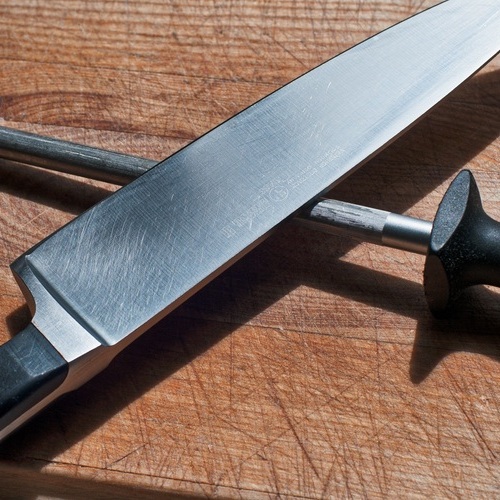My Dad was a butcher. As such, he knew some things about sharpening knives. It seemed like every Thanksgiving he would get out this massive blade that looked like a machete for the kitchen along with what looked like a long metal rod with a handle (aka knife steel). With the skill of a Benihana chef, he would begin to take the machete and run it back and forth on the steel until he was satisfied that the blade was sharp before carving up the turkey. It took metal on metal to turn the blade from dull and harmful (it is easier to cut yourself with a dull knife) to sharp and useful. This is also the picture we are given in Scripture for “sharpening” each other in our walk with the Lord.
Iron does sharpen iron. However, that is only true when it is used properly. I never understood what to do with a knife steel and The knife steel used by an untrained person can actually harm or break a knife and not do anything to improve its cutting ability. In the same way, one person can actually harm another with their criticism. There is a fine line between criticism and critique. Criticism seeks to tear a person down, while critique seeks to help them improve. Some people are critical of everything they see and of the people they meet. Their words of criticism come from a place of inner displeasure within themselves and is spewed out on their surroundings. They aren’t offering a critique for the betterment of the other party, but as a way to express their displeasure. A person who is constantly being critical of others is not a useful tool to help another person make improvements in their life.
There is so much criticism around us today that any time a comment is made it is taken in the wrong way. While critique is often misconstrued as criticism in today’s world, it is an expectation and responsibility that we, as believers, are supposed to offer to each other. We need constructive advice in order to make the necessary changes to walk more closely with the Lord. So, just as the knife blade needs to accept the abrasion of the knife steel in order for it to be sharpened, so must we be willing to view a critique from a friend as an opportunity to improve.
Generally, we don’t like to be on either end of a conversation like this. Nobody likes it when someone else (even in the right spirit) points out to us areas that need improvement. We take any word of criticism or advice or confrontation as a negative – we don’t view the person as a friend but as an enemy. They are our adversary. We put up the defenses, make excuses and don’t let their words penetrate us to make us better. As hard as it is to be on the receiving end of a critique, I think it is even more common for people shy away from the confrontation. Sometimes, we don’t want to offend or seem critical or to be taken the wrong way – so we don’t say anything. But in keeping a word of accountability to ourselves, we are actually doing harm to the one who needs the critique – and not fulfilling our responsibility to help them in their Christian walk.
In the end, we need to be “speaking the truth in love, may grow up into him in all things” (Ephesians 4:15). This needs to be done among friends – between other believers – in order to strengthen us, build us up, and draw us closer to Christ. When given AND received in the right spirit, you should be thankful when a brother in Christ comes to you to address a need they see in your life. We have a responsibility to help each other, bear each other’s burdens, and share in the encouragement we need to stay on the right path. We are to be iron sharpening iron!

